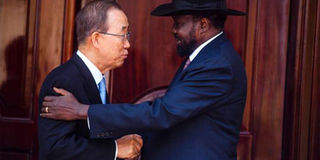S. Sudan could join EAC despite reports of violence, abuses

UN Secretary General Ban Ki-moon (L) shakes hands with South Sudan's President Salva Kiir, as he leaves the State House in Juba after their meeting, on February 25, 2016. The five heads of state and government of Kenya, Tanzania, Rwanda, Burundi and Uganda will on Wednesday deliberate on formally admitting South Sudan into the East African Community. PHOTO | ALBERT GONZALEZ |
What you need to know:
- The East African Community could soon admit South Sudan into its fold despite reports of war crimes and violence in the world’s youngest country.
- The five heads of state and government of Kenya, Tanzania, Rwanda, Burundi and Uganda will on Wednesday next week deliberate on formally admitting South Sudan into the regional bloc.
- A statement from EAC headquarters in Arusha said the leaders would decide “on the negotiations on the admission of South Sudan into the community” among other issues.
- Juba’s step towards joining the EAC now depends on whether the leaders would endorse a report by the council of ministers, which has recommended the country’s admission though citing certain areas that member states may have to assist.
The East African Community could soon admit South Sudan into its fold despite reports of war crimes and violence in the world’s youngest country.
The five heads of state and government of Kenya, Tanzania, Rwanda, Burundi and Uganda will on Wednesday next week deliberate on formally admitting South Sudan into the regional bloc.
A statement from EAC headquarters in Arusha said the leaders would decide “on the negotiations on the admission of South Sudan into the community” among other issues.
Juba’s step towards joining the EAC now depends on whether the leaders would endorse a report by the council of ministers, which has recommended the country’s admission though citing certain areas that member states may have to assist.
If it happens, it would be a sweet end to a five-year wait for Juba and a potentially expanded market for traders in the region.
CONTRADICTION
But it could also contradict one of the tenets under which EAC was established.
According to the treaty establishing the EAC, new members are admitted if they respect the principles of democracy, rule of law, accountability, transparency and social justice.
The treaty also says the countries must, besides being geographically near any of the existing members, practise “equal opportunities, gender equality as well as the recognise, promote and protect rights in accordance with the provisions of the African Charter on Human and Peoples’ Rights.”
South Sudan applied to join the EAC soon after it gained independence in July 2011.
That year, the community rejected the application of Khartoum, citing its poor democratic record, religious freedom and open gender discrimination.
For South Sudan, the process also stalled due to what diplomats said were the country’s institutional weakness.
However, after negotiations, EAC summit of heads in Kampala recommended that Juba’s application be speeded up for a possible admission before the end of 2014.
CIVIL WAR
This never happened because the country plunged into a brutal civil war.
The process resumed last year even as the UN, Amnesty International and Human Rights Watch accused the government and rebels of committing war crimes.
On Friday, Juba defended its desire to join the community, arguing that issues of democracy and human rights could be grown within the EAC.
“We feel that bloc is our rightful place because we have many things in common with other EAC members.
That is how we can grow our institutions,” Mr James P Morgan, the country’s deputy ambassador in Nairobi told the Nation.
Mr Morgan said incidents cited by rights defenders should be considered in isolation.
“During a rebellion, things happen. Some areas fall in the hands of the government, others in the hands of rebels. You can’t blame the government,” he said.
South Sudan says it has fulfilled some of conditions like opening up its markets, reducing immigration procedures for EAC citizens and launching amending relevant laws.





